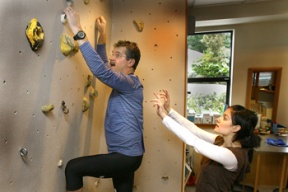Ernie Franz and Sen. Rockefeller hope to change the law on victim compensation.
Ernie Franz was struck from behind by a drunk driver two years ago, rocketing the surgeon off his bicycle, over the hood of the speeding sedan and into a ditch along High School Road.
As he recovered from a fractured spine, a broken neck, cracked ribs, a lacerated liver and two broken arms, the island resident and former emergency surgeon was blindsided again – this time by the state.
Franz was ordered to pay back two-thirds of the money he received from the state’s Crime Victims Compensation Program after he received $50,000 from the driver’s insurance company.
“The state put a lein on me, telling me I have to pay back $7,600,” said Franz. “I was quite fortunate in the accident, but I’ll never work in an emergency room again. I’ll never be whole. It just didn’t seem right.”
It also didn’t seem right to state Sen. Phil Rockefeller, who pledged to change the victims compensation program this year in the state Legislature after learning of Franz’s experience.
“The state seeking to recover that money is plain unfair,” the Bainbridge Democrat said. “I want to rewrite that law, eliminate the recovery and take care of people like Dr. Franz.”
Rockefeller and Franz are calling on the state to end the fund’s repayment policy if the victim is permanently disabled. Barring that, Franz would like the state to seek repayment through the offender rather than the victim.
“For someone who’s life is changed forever and earning potential is changed forever, the state should get the money back from the person who caused the injury or else forgive it,” Franz said.
Marsha Masters, president of the Mothers Against Drunk Drivers’ Kitsap chapter, strongly supports Rockefeller’s proposed measure.
“It’s a good idea because the state should never have gone back on what it paid (Franz). It was crazy.
“Hopefully, others who need money right away after an injury won’t have to give the money back.”
Franz was struck in August 2004 by a Dodge Magnum driven by 19-year-old island resident Todd Duffner. Witnesses said Duffner was swerving erratically at about 50 mph.
Duffner later pleaded guilty to vehicular assault and was sentenced to six months in jail and substance abuse treatment.
Franz woke up four days after the crash in Harborview Medical Center emergency room, not knowing how he got there.
He was treated for neck fractures and ruptured discs, a bruised spinal cord, eight rib fractures, a lacerated liver, two broken arms with severe bruising, a fractured leg and a collapsed lung.
Franz estimates his medical costs and physical therapy treatments have topped $400,000 over the last 28 months. Much of this was covered by his medical insurance, Duffner’s insurance and $11,500 from the state crime victims program.
While the program’s application clearly states that a victim may need to pay back part of the compensation if the offender’s insurance chips in, Franz believes his permanent injuries should exempt him from the rule.
“When I did that paperwork, I could barely hold a pen,” he said. “I didn’t realize there was a possibility of repayment. I can see now why you may have to repay funds, (but) it seems like the state should consider forgiving that when the victim has no possibility of being made whole again.”
Franz, who worked at Seattle’s Virginia Mason Medical Center until the accident, can no longer hold a scalpel, stitch wounds or stand for long periods.
“My career is gone,” he said.
Franz visits his physical therapist weekly, where he strengthens his hips, upper body and hands. He also attends regular indoor cycling and yoga classes.
He volunteers three times a week at the University of Washington’s medical school as he ponders a possible new vocation as an educator.
“That’s been really fun, working with students,” he said. “I’m jumping into a lot of things, seeing what works for me now.”
Franz’s family, which includes his wife Gwen and three children, ages 12, 14 and 16, is largely supported by limited-term disability payments drawn from his former job at Virginia Mason.
“I’ve probably got two and a half years to figure out what to do to earn a living,” he said. “Whatever I do in life, I hope it ends up being a passion as well.”
Franz said he’s got plenty of passion to take to Olympia.
“I’ve written the governor, I’ve talked with (Congressman) Jay Inslee on many occasions,” he said. “I’d be very happy to be involved in any effort (Rockefeller) puts forth on this. I’ll drive down and testify, provide letters, documents. Anything I can do, I’d make it happen.”
According to the state Department of Labor and Industries, which runs the compensation fund, about $15 million is paid out annually to victims. With limited resources, the fund cannot afford to pay benefits to people drawing from insurance and other compensation sources.
According to Rockefeller, the amount may have recently taken a substantial dip. An L&I staffer was recently found to have embezzled money from the fund, he said.
L&I has not yet released details in the case, but Rockefeller said a “significant amount” was drained from the fund.
“It’s bad,” Rockefeller said. “That’s all they’ll tell me.”
L&I is expected to release additional details later this week.
Franz isn’t looking to get his small piece of the fund back. He just wants to make sure others in a similar situation don’t find that the money they need has disappeared.
“I’m incredibly fortunate,” he said. “I wasn’t killed. I don’t have brain injuries. I’m thankful I’m not in pain anymore. The money they took back is a drop in the bucket. But for somebody else dealing with life-changing injuries, it could mean a lot. If I can make their lives easier, I’m happy to do it.”



